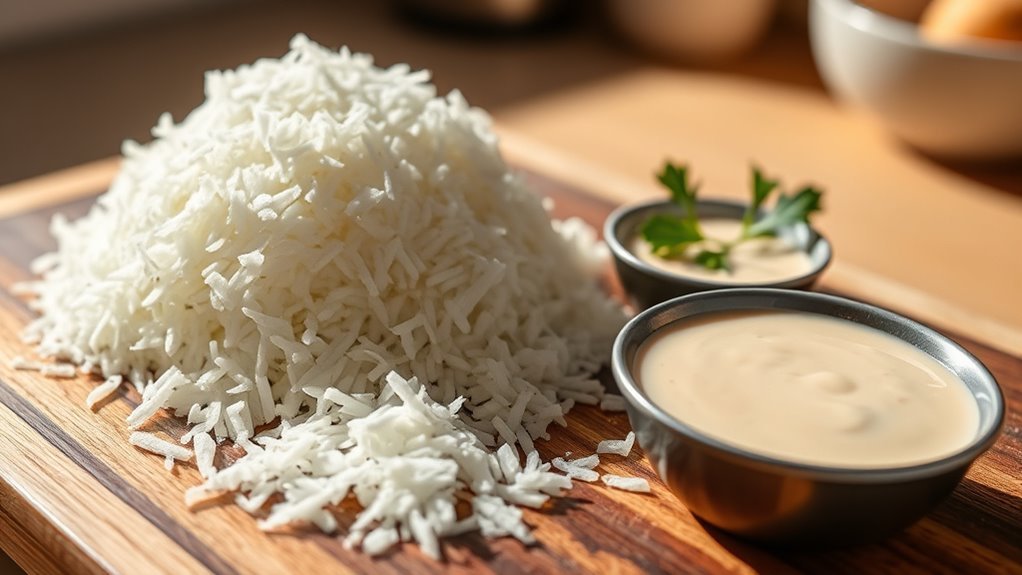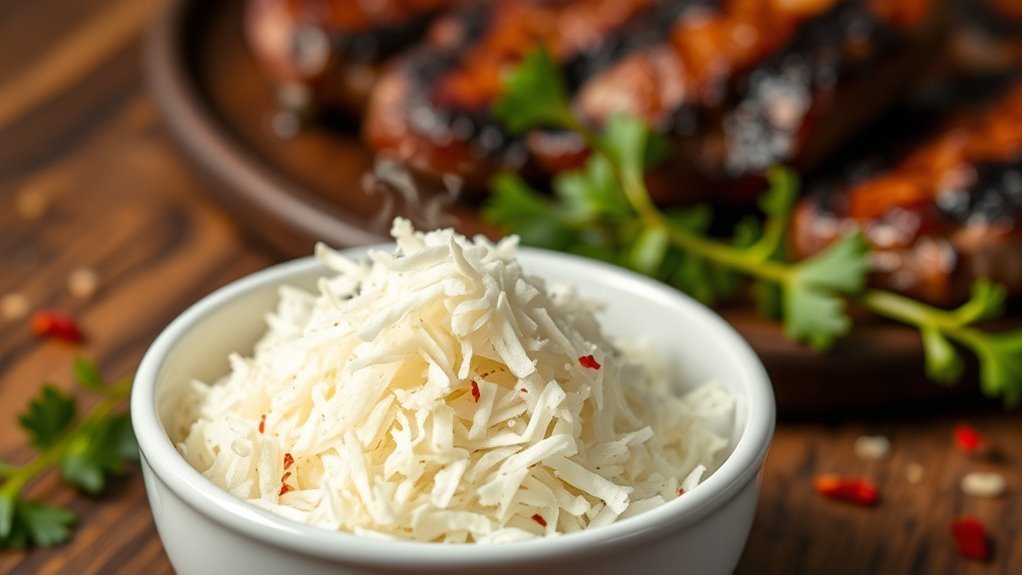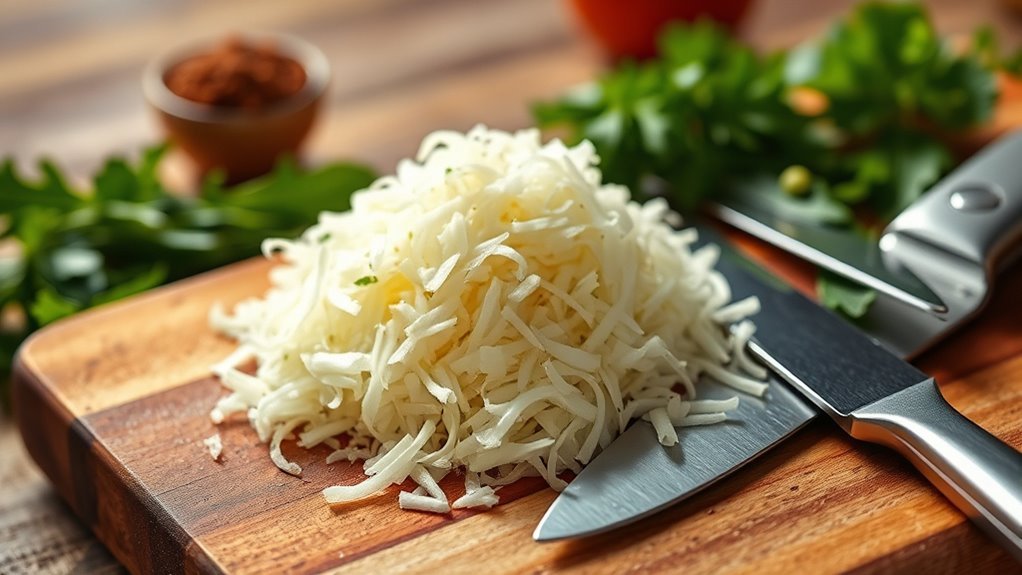Yes, horseradish is keto-friendly! It’s low in carbs, with about 2 grams of net carbs per tablespoon. This makes it a flavorful addition to your meals without compromising your carbohydrate intake. Plus, horseradish offers health benefits like high antioxidant properties and digestive support. However, it’s best to use it in moderation, as excessive consumption can lead to digestive issues. If you want to learn more about incorporating horseradish into your keto diet, there’s plenty more to explore!
Understanding the Keto Diet

When you’re exploring dietary options, it’s important to understand the fundamentals of the ketogenic (keto) diet. This low-carb, high-fat diet shifts your body into a state of ketosis, where it burns fat for fuel instead of carbohydrates. To successfully adopt this lifestyle, effective keto meal planning is essential. You’ll need to focus on understanding macros—specifically, the ratio of fats, proteins, and carbohydrates in your meals. Typically, a keto diet consists of about 70-75% fats, 20-25% proteins, and only 5-10% carbs. By keeping track of these ratios, you can guarantee you’re fueling your body properly while enjoying a variety of delicious foods. Embracing this approach can lead to greater freedom in your dietary choices and overall well-being.
What Is Horseradish?

Horseradish is a root vegetable known for its pungent flavor and distinct heat, often used as a condiment or flavor enhancer in various cuisines. Its origins trace back to Europe and Asia, where it has been cultivated for centuries. You’ll find different horseradish varieties, each offering unique flavors and heat levels.
| Horseradish Variety | Description |
|---|---|
| Common Horseradish | The most widely used, sharp and spicy. |
| Black Horseradish | Stronger flavor, often used in specialty dishes. |
| White Horseradish | Milder, used in sauces and dressings. |
| Wasabi | Similar family, known for its spiciness in Japanese cuisine. |
Exploring these varieties can enhance your culinary experiences and broaden your palate!
Nutritional Profile of Horseradish

The nutritional profile of horseradish reveals a low-calorie condiment packed with beneficial compounds. You’ll find that it’s rich in vitamins C and B6, along with minerals like potassium and calcium. Different horseradish varieties, such as the common and Japanese types, offer unique flavors and culinary uses. Whether you’re adding it to sauces, dressings, or roasted meats, horseradish elevates dishes while providing health benefits. Its natural compounds have antimicrobial properties, which can support your immune system. Plus, with minimal calories and fat, it fits well into various dietary lifestyles, including keto. Incorporating horseradish into your meals not only enhances taste but also contributes to a nutritious and balanced diet. Enjoy the versatility it brings to your table!
Carb Content in Horseradish
When considering horseradish in a keto diet, it’s important to look at its carb content. A typical serving contains minimal carbohydrates, which can be calculated to determine its net carbs after accounting for fiber. Understanding these details helps you make informed choices about incorporating horseradish into your meals.
Horseradish Nutritional Profile
Rich in flavor and often used as a condiment, horseradish boasts a surprisingly low carbohydrate content, making it a suitable choice for those following a keto diet. Different horseradish varieties, like the common horseradish and wasabi, offer unique tastes that enhance various dishes. You can easily incorporate horseradish into your culinary repertoire, whether you’re adding it to sauces, dressings, or meat dishes. A typical serving contains minimal carbs, allowing you to enjoy its zesty kick without compromising your carb limits. This versatility not only satisfies your taste buds but also aligns with your dietary goals. So, when you’re looking for bold flavors that fit your lifestyle, horseradish can be a fantastic addition to your table.
Net Carbs Calculation
While evaluating the carb content in horseradish, it’s important to focus on net carbs, which are the carbohydrates that impact blood sugar levels. Generally, fresh horseradish contains about 4 grams of total carbs per tablespoon, with roughly 2 grams of fiber, leading to a net carb count of around 2 grams. When you look at different horseradish varieties, like prepared horseradish or horseradish sauces, the net carb comparison can change considerably due to added sugars. For instance, some commercial sauces may contain 5–10 grams of net carbs per serving. If you’re following a keto diet, opting for fresh or minimally processed horseradish can help you stay within your carb limits while enjoying its unique flavor.
Health Benefits of Horseradish
Horseradish isn’t just a zesty addition to your meals; it also boasts a nutrient-rich profile packed with vitamins and minerals. Its high antioxidant properties can help combat oxidative stress, while it may support digestive health by promoting enzyme activity. Incorporating horseradish into your diet could provide these benefits, making it a valuable addition to your keto lifestyle.
Nutrient-Rich Profile
Although many might think of horseradish as just a spicy condiment, it actually boasts a nutrient-rich profile that offers several health benefits. This root vegetable is low in calories but high in nutrient density, making it a great addition to a balanced diet. Here’s a quick overview of some horseradish benefits:
| Nutrient | Amount per 100g |
|---|---|
| Vitamin C | 24 mg |
| Fiber | 4.7 g |
| Calcium | 60 mg |
Incorporating horseradish into your meals can enhance flavor while providing essential vitamins and minerals. Its impressive nutrient density means you’re getting more bang for your buck, enabling you to enjoy freedom in your dietary choices without compromising on health.
Antioxidant Properties
Antioxidants play an essential role in protecting your body from oxidative stress, and horseradish is a surprising source of these beneficial compounds. The antioxidant benefits of horseradish can help combat inflammation and support overall health. Here are some key horseradish compounds that contribute to its effectiveness:
- Glucosinolates, which may help detoxify harmful substances
- Vitamin C, known for its immune-boosting properties
- Phenolic acids, which have anti-inflammatory effects
- Carotenoids, linked to improved eye health
- Flavonoids, which support cardiovascular health
Incorporating horseradish into your diet not only adds flavor but also provides a potent punch of antioxidants. This makes it a valuable addition to a balanced, health-conscious lifestyle.
Digestive Health Support
When you’re looking to boost your digestive health, horseradish can be a surprising ally. This zesty root contains compounds that may enhance the production of digestive enzymes, helping your body break down food more efficiently. In addition, horseradish has been linked to a healthier gut microbiome, supporting the balance of beneficial bacteria in your digestive tract. A diverse and thriving microbiome is essential for ideal digestion and overall health. Plus, horseradish’s natural antimicrobial properties can assist in keeping harmful pathogens at bay. Including this spicy ingredient in your meals not only adds flavor but also contributes to your digestive wellness. So, if you’re seeking a simple way to enhance your gut health, consider incorporating horseradish into your diet.
How to Incorporate Horseradish Into Your Diet
Incorporating horseradish into your diet can be both simple and delicious, offering a unique flavor profile to various dishes. It’s versatile and can add a spicy kick to your meals. Here are some great ways to enjoy it:
Incorporate horseradish into your meals for a deliciously spicy kick and a unique flavor boost.
- Mix horseradish into homemade horseradish sauces to pair with meats or seafood.
- Use it as an ingredient in spicy dressings for salads, enhancing both taste and nutrition.
- Spread it on sandwiches or burgers for an extra zing.
- Stir it into soups or stews for a warming effect.
- Add it to dips for a flavorful twist.
Possible Drawbacks of Horseradish on Keto
While horseradish can enhance your meals with its bold flavors, there are some potential drawbacks to evaluate if you’re following a keto diet. One consideration is its possible side effects, especially if you have a sensitive stomach. Some people might experience digestive issues, such as gas or bloating, after consuming horseradish. Additionally, excessive consumption can lead to more severe reactions, including nausea or irritation. Since it’s often used in sauces or condiments, it’s easy to go overboard, which might not align with your dietary goals. Moderation is key; enjoying horseradish in small amounts can help you reap its benefits without running into these drawbacks. Always listen to your body and adjust your intake accordingly.
Alternative Low-Carb Condiments
If you’re on a keto diet and looking for flavorful alternatives to traditional high-carb condiments, there are plenty of options that won’t derail your progress. You can enjoy a variety of alternative low-carb condiments that complement your meals while keeping your carb count in check. Here are some keto-friendly sauces you might consider:
- Mustard: Low in carbs and rich in flavor.
- Mayonnaise: Opt for sugar-free versions to stay keto-compliant.
- Hot Sauce: Adds a spicy kick without added sugars.
- Pesto: Packed with herbs and healthy fats, it’s a great addition to dishes.
- Soy Sauce: A tasty, low-carb option for seasoning.
These alternatives not only enhance your meals but also support your keto lifestyle without compromising on taste.
Recipes Featuring Horseradish
Horseradish can elevate your dishes with its distinct, spicy flavor, making it a versatile ingredient in various recipes. You can create delicious horseradish sauces to accompany meats, adding a zesty kick to your steak or grilled chicken. A simple sauce combines horseradish, sour cream, and lemon juice for a creamy, tangy side.
For a crowd-pleasing option, whip up horseradish dips using Greek yogurt and fresh herbs, perfect for veggies or low-carb crackers. You might also consider mixing it into deviled eggs for an unexpected twist. Experimenting with horseradish in your kitchen not only enhances flavor but also aligns with your low-carb lifestyle, providing excitement without compromising your dietary goals. Enjoy the freedom of creativity in your cooking!
Final Thoughts on Horseradish and Keto
As you explore the world of low-carb diets, it’s essential to know how horseradish fits into your keto lifestyle. This pungent root offers several benefits that can enhance your meals while keeping carbs low.
Consider these horseradish benefits:
- Low in calories and carbs
- High in antioxidants
- May boost metabolism
- Supports digestive health
- Adds bold flavor to dishes
Incorporating horseradish into your keto recipes can be easy and delicious. Whether you use it in sauces, dressings, or as a seasoning, it can elevate your culinary creations. So, don’t shy away from this zesty ingredient; it can bring both flavor and health benefits to your keto journey while allowing you the freedom to enjoy your meals.
Frequently Asked Questions
Can Horseradish Trigger Keto Flu Symptoms?
Horseradish itself isn’t likely to trigger keto flu symptoms directly. The keto flu is typically caused by your body adapting to a low-carb diet, leading to symptoms like fatigue and headaches. While horseradish has unique compounds that may affect digestion, its effects are generally mild. If you’re sensitive to spicy foods, you might experience digestive discomfort, but that’s not the same as keto flu. Focus on staying hydrated and balanced during your changeover.
How Much Horseradish Can I Eat on Keto?
When it comes to horseradish, you might find yourself torn between indulging in its spicy kick and adhering to keto guidelines. Generally, you can enjoy a couple of tablespoons of horseradish per serving without worrying about carb overload. Just keep in mind that moderation is key; too much could lead to digestive issues. So, embrace its flavor while ensuring your total carb intake aligns with your keto goals for a balanced approach!
Is Horseradish Sauce Keto-Friendly?
Horseradish sauce can be keto-friendly, but it really depends on the ingredients used. Many store-bought varieties contain added sugars or high-carb fillers, which can kick you out of ketosis. If you’re following a keto diet, it’s best to check the label or make your own sauce using fresh horseradish, vinegar, and spices. This way, you can enjoy the flavor without compromising your carb intake. Always be mindful of portion sizes!
Are There Any Allergens in Horseradish?
When you think of horseradish, you might picture a fiery kick that awakens your senses. While horseradish nutrition is impressive, it’s essential to know that it can cause allergic reactions in some individuals, particularly those sensitive to mustard or radish family plants. However, for most people, horseradish benefits include anti-inflammatory properties and potential digestion support. Always consult with a healthcare professional if you’re unsure about allergens in your diet.
Can Horseradish Affect Blood Sugar Levels?
Horseradish generally doesn’t cause significant spikes in blood sugar levels. In fact, it’s low in carbohydrates and calories, making it a great addition to your meals if you’re monitoring those levels. The horseradish benefits include its potential anti-inflammatory properties and ability to support digestion, which can also positively influence blood sugar management. Always consider your overall diet and consult with a healthcare professional if you have specific concerns about blood sugar or dietary restrictions.
Is horseradish keto-friendly?
Yes, horseradish is considered keto-friendly. It is low in carbohydrates, with only about 1 gram of carbs per tablespoon. Because of its strong flavor, it can be used in small amounts to enhance dishes without significantly impacting your daily carb limit on a ketogenic diet.
How many carbs are in horseradish?
Horseradish contains approximately 1 gram of carbohydrates per tablespoon (about 15 grams). This makes it a suitable condiment for those following a ketogenic diet, as it can be enjoyed without exceeding daily carbohydrate limits.
Can horseradish be used in keto recipes?
Absolutely! Horseradish can be incorporated into various keto recipes. Its robust flavor makes it an excellent addition to sauces, dressings, and marinades. It can also be used as a topping for meats and seafood, providing a spicy kick without adding significant carbs.
Are there any health benefits of horseradish on a keto diet?
Yes, horseradish has several health benefits that can complement a keto diet. It is rich in antioxidants and can aid in digestion. Additionally, it has antibacterial properties and may help to boost the immune system. Incorporating horseradish in moderation can enhance flavor while providing these health benefits.
What should I look for when buying horseradish for a keto diet?
When purchasing horseradish, look for options with minimal added ingredients. Some prepared horseradish products may contain sugars or other additives that could increase carbohydrate content. Ideally, choose pure horseradish or those labeled as “no sugar added” to ensure they align with your keto goals.
References
- https://en.wikipedia.org/wiki/Horseradish
- https://www.ncbi.nlm.nih.gov/pmc/articles/PMC6073289/
- https://www.healthline.com/nutrition/keto-diet-food-list
- https://www.ncbi.nlm.nih.gov/pmc/articles/PMC5930598/
- https://www.webmd.com/diet/obesity/ss/slideshow-keto-diet-foods
- https://www.ncbi.nlm.nih.gov/pmc/articles/PMC4782086/
- https://www.cdc.gov/healthyweight/healthy_eating/index.html
- https://www.hsph.harvard.edu/nutritionsource/healthy-weight/
- https://www.mayoclinic.org/healthy-lifestyle/nutrition-and-healthy-eating/in-depth/keto-diet/art-20460461


